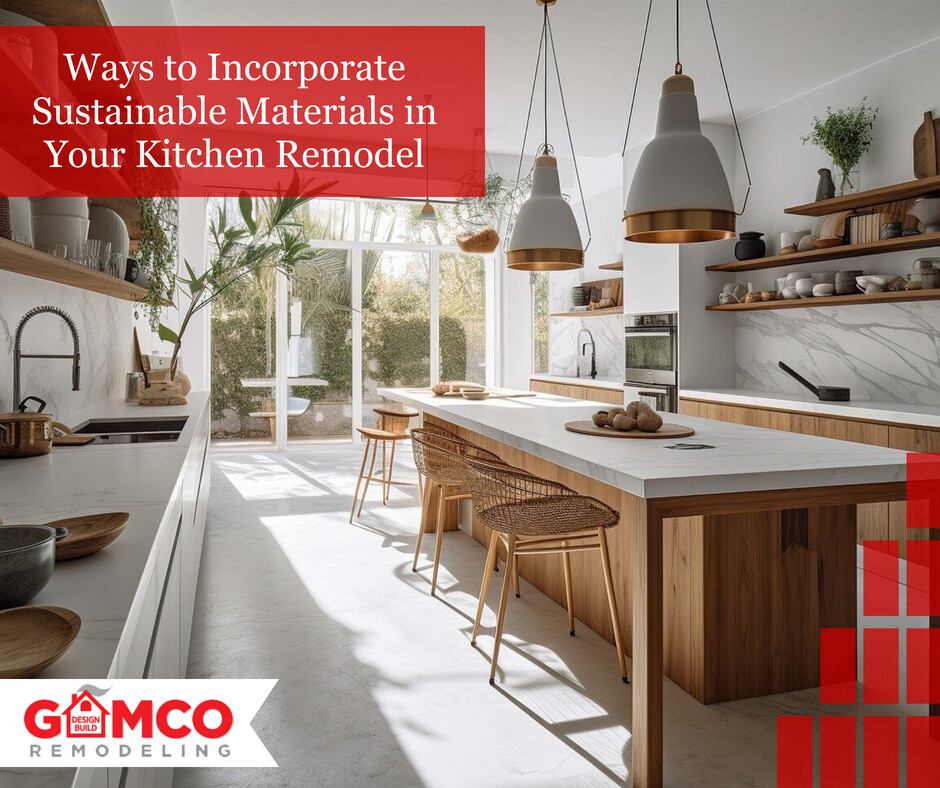
Embarking on a kitchen remodel is an exciting endeavor that allows you to breathe new life into one of the most cherished spaces in your home. However, as our collective consciousness shifts towards sustainability and environmental stewardship, many homeowners are seeking ways to make their kitchen renovations more eco-friendly. In this comprehensive guide, we’ll explore various ways to incorporate sustainable materials into your kitchen remodel, helping you create a space that is not only beautiful and functional but also environmentally responsible.
Why Choose Sustainable Materials?
Before delving into the specifics of sustainable kitchen materials, it’s essential to understand the rationale behind this eco-conscious approach. By opting for sustainable materials in your kitchen remodel, you’re making a positive impact on the environment in several ways:
- Reduced Environmental Footprint: Sustainable materials are typically sourced and manufactured using eco-friendly practices, resulting in a lower carbon footprint compared to conventional materials.
- Conservation of Natural Resources: Many sustainable materials are derived from renewable resources or recycled materials, reducing the strain on finite natural resources.
- Improved Indoor Air Quality: Sustainable materials are often free from harmful chemicals and volatile organic compounds (VOCs), promoting healthier indoor air quality for you and your family.
- Long-Term Cost Savings: While sustainable materials may have a higher upfront cost, they often boast superior durability and longevity, resulting in long-term cost savings and reduced maintenance requirements.
Sustainable Materials for Your Kitchen Remodel
Now, let’s explore some of the most popular sustainable materials that you can incorporate into your kitchen remodel:
- Bamboo
Bamboo is a rapidly renewable resource that has gained popularity as a sustainable alternative to traditional hardwoods. It boasts impressive strength and durability, making it an ideal choice for kitchen cabinets, flooring, and countertops. Additionally, bamboo has a distinctive aesthetic appeal, lending a touch of natural warmth to your kitchen space.
- Reclaimed Wood
Reclaimed wood offers a unique opportunity to breathe new life into salvaged materials, reducing the demand for freshly harvested timber. Whether sourced from old barns, factories, or warehouses, reclaimed wood exudes character and charm, adding rustic elegance to your kitchen remodel. Consider incorporating reclaimed wood into your cabinetry, flooring, or accent walls for a one-of-a-kind look.
- Recycled Glass
Recycled glass countertops are a stunning eco-friendly option for your kitchen remodel. Made from crushed glass bottles, jars, and other recycled materials, these countertops offer durability, heat resistance, and a dazzling array of color options. By choosing recycled glass countertops, you’re diverting waste from landfills and contributing to the circular economy.
- Recycled Metal
Recycled metal accents can add a touch of industrial chic to your kitchen remodel while reducing the environmental impact of your project. Consider incorporating recycled metal hardware, light fixtures, or backsplashes made from reclaimed aluminum, copper, or stainless steel. Not only do these materials offer durability and aesthetic appeal, but they also support sustainable manufacturing practices.
- Low-VOC Paints and Finishes
When it comes to painting your kitchen walls or cabinets, opt for low-VOC (volatile organic compound) or zero-VOC paints and finishes. These eco-friendly alternatives emit fewer harmful chemicals into the air, promoting healthier indoor air quality and reducing your exposure to harmful toxins. Look for paints labeled as “low-VOC” or “zero-VOC” to ensure that your kitchen remodel is as environmentally friendly as possible.
- Energy-Efficient Appliances
In addition to sustainable materials, don’t overlook the importance of energy-efficient appliances in your kitchen remodel. Look for appliances with ENERGY STAR certification, which signifies that they meet strict energy efficiency criteria set by the Environmental Protection Agency (EPA). Energy-efficient appliances not only reduce your carbon footprint but also save you money on utility bills over time.
- Eco-Friendly Flooring
When selecting flooring for your kitchen remodel, consider eco-friendly options such as cork, linoleum, or sustainable hardwoods. Cork flooring is derived from the renewable bark of cork oak trees and offers natural resilience, sound absorption, and thermal insulation properties. Linoleum is made from natural materials such as linseed oil, cork dust, and wood flour, making it a sustainable and durable choice for kitchen floors.
- LED Lighting
Lighting plays a crucial role in any kitchen remodel, and opting for energy-efficient LED lighting can significantly reduce your home’s energy consumption. LED bulbs consume less energy, last longer, and emit less heat than traditional incandescent bulbs, making them an eco-friendly choice for illuminating your kitchen space. Consider installing LED recessed lights, under-cabinet lighting, or pendant fixtures to enhance both aesthetics and energy efficiency.
- Water-Efficient Fixtures
Incorporating water-efficient fixtures into your kitchen remodel can help conserve this precious resource and reduce your household’s water consumption. Look for faucets and sink fixtures with the WaterSense label, which indicates that they meet water efficiency and performance criteria established by the EPA. Additionally, consider installing a high-efficiency dishwasher and water-saving aerators on faucets to further minimize water usage in your kitchen.
- Eco-Friendly Countertop Materials
In addition to recycled glass countertops, there are several other eco-friendly options to consider for your kitchen remodel. Materials such as concrete, recycled paper, and composite surfaces made from recycled materials offer durability, versatility, and sustainability. These innovative countertop materials come in a variety of colors and textures, allowing you to customize your kitchen design while minimizing your environmental impact.
Conclusion
Incorporating sustainable materials into your kitchen remodel is not only a responsible choice for the environment but also a reflection of your commitment to creating a healthier, more eco-friendly home. By choosing renewable resources, recycled materials, and energy-efficient products, you can transform your kitchen into a stylish and sustainable space that enhances both your quality of life and your environmental footprint. Remember, every small step towards sustainability makes a meaningful difference in preserving our planet for future generations.
GAMCO Remodeling: This family owned and operated company is headed up by father-and-son-team Robert and Gordon Millard. The two Certified Remodelers bring a combined experience of more than eighty years to every project.
Follow Us now for more home remodeling tips or contact us at (631) 587-2266
